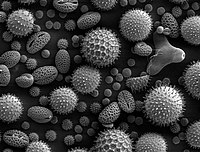
Photo from wikipedia
Previous epidemiological studies have reported an increased risk of anemia in people with allergic disorders. However, previous studies have followed a cross-sectional design. The aim of this study was to… Click to show full abstract
Previous epidemiological studies have reported an increased risk of anemia in people with allergic disorders. However, previous studies have followed a cross-sectional design. The aim of this study was to investigate the association between the two conditions with a cohort dataset. We used data of 80,943 children in the Japan Environment and Children’s Study, the largest birth cohort in Japan. The association between anemia and allergic disorders was evaluated with a logistic regression model and propensity score analysis. After adjusting for potential confounders, children with asthma (odds ratio [OR], 1.85; 95% confidence interval [CI], 1.32–2.60), atopic dermatitis (OR, 2.18; 95% CI, 1.66–2.85), allergic rhinitis (OR, 1.35; 95% CI, 1.05–1.74), allergic rhinoconjunctivitis (OR, 2.95; 95% CI, 1.91–4.54), and food allergies (OR, 1.92; 95% CI, 1.44–2.56) at 2 years of age predicted high odds of developing anemia in the next year. Any allergy at 2 years of age was associated with an increased risk of anemia at the age of 3 years (OR, 1.80; 95% CI, 1.41–2.29). The findings remained stable in the propensity score analysis. Results suggest that allergic diseases were related to caregiver-reported anemia in children.
Journal Title: Nutrients
Year Published: 2022
Link to full text (if available)
Share on Social Media: Sign Up to like & get
recommendations!